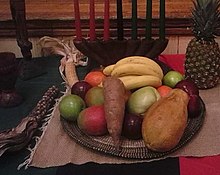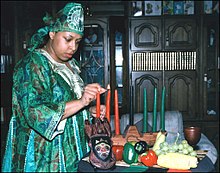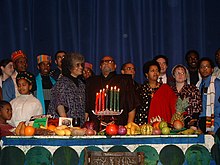Kwanzaa
| Kwanzaa | |
|---|---|
 Seven candles in a kinara symbolize the seven principles of Kwanzaa | |
| Observed by | African Americans, parts of African diaspora |
| Type | Cultural and ethnic |
| Significance | Celebrates African heritage, unity, and culture. |
| Celebrations | Unity Creativity Faith Giving gifts |
| Date | December 26 to January 1 |
| Related to | Pan-Africanism |
Kwanzaa (/ˈkwɑːn.zə/) is an annual celebration of African-American culture that is held from December 26 to January 1, culminating in a communal feast called Karamu, usually held on the 6th day.[1] It was created by Maulana Karenga, based on African harvest festival traditions from various parts of Africa, including West and Southeast Africa. Kwanzaa was first celebrated in 1966.
History and etymology[]
American Maulana Karenga created Kwanzaa in 1966 during the aftermath of the Watts riots[2] as a specifically African-American holiday.[3][4] Karenga said his goal was to "give blacks an alternative to the existing holiday of Christmas and give blacks an opportunity to celebrate themselves and their history, rather than simply imitate the practice of the dominant society."[5] For Karenga, a major figure in the Black Power movement of the 1960s and 1970s, the creation of such holidays also underscored the essential premise that "you must have a cultural revolution before the violent revolution. The cultural revolution gives identity, purpose, and direction."[6]
According to Karenga, the name Kwanzaa derives from the Swahili phrase matunda ya kwanza, meaning "first fruits".[7] First fruits festivals exist in Southern Africa, celebrated in December/January with the southern solstice, and Karenga was partly inspired by an account he read of the Zulu festival Umkhosi Wokweshwama.[8] It was decided to spell the holiday's name with an additional "a" so that it would have a symbolic seven letters.[9]
During the early years of Kwanzaa, Karenga said it was meant to be an alternative to Christmas. He believed Jesus was psychotic and Christianity was a "White" religion that Black people should shun.[10] As Kwanzaa gained mainstream adherents, Karenga altered his position so practicing Christians would not be alienated, stating in the 1997 book Kwanzaa: A Celebration of Family, Community, and Culture that "Kwanzaa was not created to give people an alternative to their own religion or religious holiday."[11] Many African Americans who celebrate Kwanzaa do so in addition to observing Christmas.[12]
After its initial creation in California, Kwanzaa spread outside the United States.[13]
Nguzo Saba (The Seven Principles)[]

Kwanzaa celebrates what its founder called the seven principles of Kwanzaa, or Nguzo Saba (originally Nguzu Saba – the seven principles of African Heritage). They were developed in 1965, a year before Kwanzaa itself. These seven principles comprise Kawaida, a Swahili word meaning "common".
Each of the seven days of Kwanzaa is dedicated to one of the principles, as follows:[14]
- Umoja (Unity): To strive for and to maintain unity in the family, community, nation, and race.
- Kujichagulia (Self-Determination): To define and name ourselves, as well as to create and speak for ourselves.
- Ujima (Collective Work and Responsibility): To build and maintain our community together and make our brothers' and sisters' problems our problems and to solve them together.
- Ujamaa (Cooperative economics): To build and maintain our own stores, shops, and other businesses and to profit from them together.
- Nia (Purpose): To make our collective vocation the building and developing of our community in order to restore our people to their traditional greatness.
- Kuumba (Creativity): To do always as much as we can, in the way we can, in order to leave our community more beautiful and beneficial than we inherited it.
- Imani (Faith): To believe with all our hearts in our people, our parents, our teachers, our leaders, and the righteousness and victory of our struggle.
Symbols[]
Kwanzaa celebratory symbols include a mat (Mkeka) on which other symbols are placed:
- a Kinara (candle holder for seven candlesticks[15])
- Mishumaa Saba (seven candles)
- mazao (crops)
- Mahindi (corn), to represent the children celebrating (and corn may be part of the holiday meal).[16]
- a Kikombe cha Umoja (unity cup) for commemorating and giving shukrani (thanks) to African Ancestors
- Zawadi (gifts).
Supplemental representations include a Nguzo Saba poster,[17] the black, red, and green bendera (flag), and African books and artworks—all to represent values and concepts reflective of African culture and contribution to community building and reinforcement.[18]
Observances[]

Families celebrating Kwanzaa decorate their households with objects of art, colorful African cloth such as kente, especially the wearing of kaftans by women, and fresh fruits that represent African idealism. It is customary to include children in Kwanzaa ceremonies and to give respect and gratitude to ancestors. Libations are shared, generally with a common chalice, Kikombe cha Umoja, passed around to all celebrants. Non-African Americans also celebrate Kwanzaa.[19] The holiday greeting is "Joyous Kwanzaa".[20][21][22]
A Kwanzaa ceremony may include drumming and musical selections, libations, a reading of the African Pledge and the Principles of Blackness, reflection on the Pan-African colors, a discussion of the African principle of the day or a chapter in African history, a candle-lighting ritual, artistic performance, and, finally, a feast of faith (Karamu Ya Imani).[23][24] The greeting for each day of Kwanzaa is Habari Gani?,[25] which is Swahili for "How are you?"[26]
At first, observers of Kwanzaa avoided the mixing of the holiday or its symbols, values, and practice with other holidays, as doing so would violate the principle of kujichagulia (self-determination) and thus violate the integrity of the holiday, which is partially intended as a reclamation of important African values. Today, some African American families celebrate Kwanzaa along with Christmas and New Year.[27]
Cultural exhibitions include the Spirit of Kwanzaa, an annual celebration held at the John F. Kennedy Center for the Performing Arts featuring interpretive dance, African dance, song and poetry.[28][29][30]
Adherence[]
The popularity of celebration of Kwanzaa has declined with the waning of the popularity of the black separatist movement.[31][32][33][34] Kwanzaa observation has declined in both community and commercial contexts.[35][36][37] University of Minnesota Professor Keith Mayes did not report exact figures, noting that it is also difficult to determine these for the three other main African-American holidays.[38] Mayes added that White institutions now celebrate it.[19]

The National Retail Federation has sponsored a marketing survey on winter holidays since 2004, and in 2015 found that 1.9% of those polled planned to celebrate Kwanzaa – about six million people in the United States.[39]
Starting in the 1990s, the holiday became increasingly commercialized, with the first Hallmark Card being sold in 1992,[40] and there has been concern about this damaging the holiday's values.[41]
Recognition[]
Academics[]
Stjepan Meštrović, a sociology professor at the Texas A&M University, sees Kwanzaa as an example of postmodernism. According to Meštrović, post-modernists in modern society may view "real" traditions as racist, sexist or otherwise oppressive, but since living in a world where nothing is true is too terrifying to most people, "nice" and "synthetic" traditions like Kwanzaa have been created to cope with the nihilistic, individualistic modern society.[42]
In popular media[]
Maya Angelou narrated a documentary film about Kwanzaa, The Black Candle, written and directed by M.K. Asante Jr. and featuring Chuck D.[43][44]
US government[]
The first Kwanzaa stamp, designed by Synthia Saint James, was issued by the United States Post Office in 1997, and in the same year Bill Clinton gave the first presidential declaration marking the holiday.[45][46] Subsequent presidents George W. Bush,[47] Barack Obama,[48] and Donald Trump[49] also issued greetings to celebrate Kwanzaa.
See also[]
- Dashiki – a shirt or suit worn during Kwanzaa and other occasions
- American holidays
References[]
- ^ "Why Kwanzaa Video". Maulana Karenga. Retrieved December 7, 2020.
- ^ Wilde, Anna Day. "Mainstreaming Kwanzaa." Public Interest 119 (1995): 68–80.
- ^ Alexander, Ron (December 30, 1983). "The Evening Hours". The New York Times. Retrieved December 15, 2006.
- ^ Ham, Mary Katharine. "My Rocky Relationship With Kwanzaa". Townhall.
- ^ Kwanzaa celebrates culture, principles Archived July 8, 2011, at the Wayback Machine
- ^ Mayes, Keith A. (2009). Kwanzaa: Black Power and the Making of the African-American Holiday Tradition. pp. 63–65. ISBN 978-0415998550. Retrieved December 27, 2015.
- ^ Holly Hartman. "Kwanzaa – Honoring the values of ancient African cultures". Infoplease.com. Retrieved October 25, 2017.
- ^ Mayes, Keith A. (2009). Kwanzaa: Black Power and the Making of the African-American Holiday Tradition. Routledge. p. 84. ISBN 9781135284008.
- ^ Mayes, Keith A. (2009). Kwanzaa: Black Power and the Making of the African-American Holiday Tradition. Routledge. p. 228. ISBN 9781135284015.
- ^ Karenga, Maulana (1967). "Religion". In Clyde Halisi, James Mtume. The Quotable Karenga. Los Angeles: University of Sankore Press. pp. 25. 23769.8.
- ^ Karenga, Maulana (1997). Kwanzaa: A Celebration of Family, Community and Culture. University of Sankore Press. p. 121. ISBN 978-0943412214.
- ^ Williams, Lena (December 20, 1990). "In Blacks' Homes, the Christmas and Kwanzaa Spirits Meet". The New York Times. Retrieved May 7, 2010.
- ^ "Kwanzaa – African-American Holiday". Encyclopædia Britannica. Encyclopædia Britannica, inc. Retrieved January 6, 2020.
Although Kwanzaa is primarily an African American holiday, it has also come to be celebrated outside the United States, particularly in the Caribbean and other countries where there are large numbers of descendants of Africans.
- ^ Karenga, Maulana (2008). "Nguzo Saba". The Official Kwanzaa Web Site. Archived from the original on December 31, 2019. Retrieved December 30, 2017.
- ^ "Definition of KINARA". www.merriam-webster.com. Retrieved December 20, 2019.
- ^ Raabe, Emily (2001). A Kwanzaa Holiday Cookbook. Rosen Publishing. p. 12. ISBN 978-0823956296.
- ^ Angaza, Maitefa (2007). Kwanzaa – From Holiday to Every Day: A complete guide for making Kwanzaa a part of your life. New York: Dafina Books. p. 56. ISBN 978-0758216656.
- ^ "The Symbols of Kwanzaa". The Official Kwanzaa Website. Archived from the original on December 4, 2016. Retrieved January 9, 2016.
- ^ Jump up to: a b Scott, Megan K. (December 17, 2009). "Kwanzaa celebrations continue, but boom is over, popularity fading". The Plain Dealer. Associated Press. Retrieved December 24, 2017.
- ^ Bush, George W. (December 23, 2004). "Presidential Kwanzaa Message, 2004". Office of the Press Secretary. Retrieved December 24, 2007.
- ^ "Clinton offers holiday messages". CNN. December 23, 1997. Retrieved December 24, 2007.
- ^ Gale, Elaine (December 26, 1998). "Appeal of Kwanzaa continues to grow; holidays: today marks start of the seven-day celebration of African culture, which began in Watts 32 years ago and is now observed by millions". Los Angeles Times. Retrieved December 24, 2007.
- ^ Johnson, James W.; Johnson, F. Francis; Slaughter, Ronald L. (1995). The Nguzo Saba and the Festival of Fruits. Gumbs & Thomas Publishers. p. 42. ISBN 9780936073200.
- ^ "A Great Kwanzaa Feast - Kwanzaa | Epicurious.com". Epicurious.
- ^ "The Founder's Message 2000". The Official Kwanzaa Web Site. Archived from the original on December 4, 2016. Retrieved December 27, 2016.
- ^ "Useful Swahili phrases". Omniglot.com. Retrieved December 27, 2016.
- ^ "Kwanzaa (until Jan 1) in the United States". Timeanddate.com. Retrieved December 27, 2016.
- ^ "The Spirit of Kwanzaa – The John F. Kennedy Center for the Performing Arts". Kennedy-center.org. Retrieved December 27, 2016.
- ^ "Dance Institute of Washington". February 21, 2001. Archived from the original on February 21, 2001. Retrieved October 25, 2017.CS1 maint: bot: original URL status unknown (link)
- ^ "Kwanzaa Featured on This Year's Holiday U.S. Postage Stamp". October 19, 2004. Archived from the original on October 19, 2004. Retrieved October 25, 2017.CS1 maint: bot: original URL status unknown (link)
- ^ Stanley, Sharon (2017). An impossible dream? : racial integration in the United States. New York, NY: Oxford University Press. ISBN 978-0190639976.
- ^ Hall, Raymond (1977). Black separatism and social reality : rhetoric and reason. New York: Pergamon Press. ISBN 9780080195100.
- ^ Dattel, Gene. "Separatism vs. Integration: Can Separate Ever Be Equal?." Academic Questions 32, no. 4 (2019): 476-486.
- ^ "Is Kwanzaa Still A Thing?". NPR.org.
- ^ Fantozzi, Madison. "Polk events celebrate values of African culture". The Ledger.
- ^ "Significance Of Kwanzaa Changes Over The Years". NPR.org.
- ^ "Gaining Or Losing Credibility By Humanizing A Reporter: A Kwanzaa Story". NPR.org.
- ^ Mayes, Keith (2009). Kwanzaa : black power and the making of the African-American holiday tradition. New York: Routledge. pp. 210, 274. ISBN 9780415998550.
- ^ "Prosper Insights & Analytics™, Monthly Consumer Survey" (PDF). National Retail Federation. October 2015.[dead link]
- ^ Martin, Douglas (December 20, 1993). "The Marketing of Kwanzaa; Black American Holiday Earns Dollars, Causing Concern". The New York Times. ISSN 0362-4331. Retrieved December 24, 2017.
- ^ "Commercialized Kwanzaa worries enthusiasts". The Billings Gazette. Retrieved December 24, 2017.
- ^ S.G. Mestrovic (January 2000). "Postemotional Law". Ro.uow.edu.au. Retrieved December 27, 2016.
- ^ "Kwanzaa Celebration Captured In 'Black Candle'". National Public Radio. December 15, 2008.
- ^ "Chuck D and Maya Angelou in Kwanzaa Documentary". Essence. December 18, 2009.
- ^ "William J. Clinton: Message on the Observance of Kwanzaa, 1997". www.presidency.ucsb.edu. Retrieved December 31, 2017.
- ^ Pleck, Elizabeth (2001). "Kwanzaa: The Making of a Black Nationalist Tradition, 1966–1990" (PDF). Journal of American Ethnic History. 20 (4): 3–28. JSTOR 27502744. Archived from the original (PDF) on March 15, 2017.
- ^ "Presidential Kwanzaa Message, 2004". georgewbush-whitehouse.archives.gov. Retrieved December 28, 2020.
- ^ "Statement by the President and the First Lady on Kwanzaa". whitehouse.gov. December 26, 2015. Retrieved December 28, 2020.
- ^ "Presidential Message on Kwanzaa", Whitehouse.gov, December 26, 2019. Retrieved December 29, 2019.
External links[]
- Official website
- The Black Candle: a Kwanzaa film narrated by Maya Angelou
- Why Kwanzaa was created by Karenga
- The History Channel: Kwanzaa
- "The Meaning of Kwanzaa in 2003". The Tavis Smiley Show. NPR. December 26, 2003. Interview: Karenga discusses the evolution of the holiday and its meaning.
- Kwanzaa
- 1966 establishments in the United States
- African-American culture
- Black Power
- December observances
- January observances
- Recurring events established in 1966
- Post–civil rights era in African-American history
- Public holidays in the United States
- Swahili words and phrases
